
The Top 25 Films of the 1990s
page 2

The Top 25 Films of the 1990s
page 2
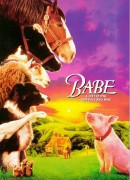 |
Starring James Cromwell, Magda Szubanski, and the voices
of Christine Cavanaugh, Miriam Margolyes, Danny Mann, and Hugo Weaving. |
|
||||||||||||||
Roscoe Lee Browne puts it best in his narration, "This is a tale of an unprejudiced heart, and how it changed our valley forever." The valley itself is an enchanting place, in no easily identifiable geographic location or era. The farm, run by the lanky, stoic Arthur Hoggett (Cromwell) and his portly, cheerful wife (Szubanski), has a strict hierarchy and order. Babe, a talking pig, upsets the status quo when he demonstrates his unwillingness to accept his destiny–as the Christmas ham–with an uncanny ability to herd sheep alongside the dogs. Hoggett, in his own quiet way, rebelliously challenges convention by not only recognizing Babe's talent, but nourishing it.
This is a superbly crafted film, a magical blend of technology and heart. The art direction, cinematography, acting, editing, special effects, writing, and musical score swirl together to form a delightful concoction. One of the most pleasant surprises of the decade, Babe deserved every ounce of its praise, including its Oscar™ nomination. It has deservedly become an enduring, beloved favorite of children and adults alike. –Jen
|
Academy Awards™ Other Major Awards |
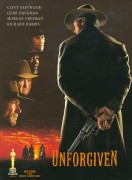 |
Starring Clint Eastwood, Morgan Freeman, Gene Hackman,
Richard Harris, Jaimz Woolvett, Saul Rubinek, and Frances Fisher. |
|
||||||||||||||
With Unforgiven, Clint Eastwood has managed to not only break Western genre bounds, but also the bounds of the anti-Western, a genre he helped create with Italian director Sergio Leone. William Munny is a man with a name–and a reputation to match. There is no mystery to this man as he rides into the western town of Big Whisky with clear intentions–to kill two men in exchange for money.
The title of the film is quite apt. Eastwood paints the Old West in a deservedly unforgiving light. He forgoes the majestic musical scores that always accompany panoramic western vistas. His shoot-outs are slow, messy, and agonizing. Nobody gets what they deserve.
Unforgiven completely shatters Western mythology, stripping it of all the glamour, all the glory, and all the romance. The whores don't have hearts of gold. The sheriff keeps the peace through brutality and intimidation. And the gunfighting protagonist is a mean, vicious murderer.
With Unforgiven, Eastwood delivers his message loud and clear; that everything we've ever seen before about the Old West is bullshit. Even his own movies. –Jen
|
Academy Awards™ Other Major Awards |
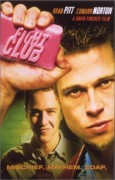 |
Starring Edward Norton, Brad Pitt, Helena Bonham Carter,
Meat Loaf, and Jared Leto. |
|
||||||||||||||
If there is a film from 1999 that can be described as "visionary," it is Fight Club. It struck a chord with the wired generation (a chord plucked earlier in the year by The Matrix, #15), tangled as we are in the pursuit of money and things we don't really need. Fight Club puts us in the head of its nameless Narrator and takes us on a journey of self-discovery, punctuated with equal parts brutality and hilarity. The greatness of the film lies in its ability to tantalizingly stoke our rage and disillusionment before delivering nihilism to its proper resting place.
Fight Club is a love story and a coming-of-age story, as much as it is an identity crisis, an anti-consumerist rant, a critique of machismo and men's movements, or a satire of cultism. Tyler Durden, the avatar of our Narrator's bifurcated personality, is no match for Marla, his savior. She is the alarm that awakens the Narrator from his somnambulance and self-flagellation. Fight Club downloads its wake-up call into our brains, and dares us to create something new for ourselves. –Jeff
Read Carlo's full-length review.
|
Academy Awards™ Other Major Awards |
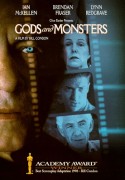 |
Starring Ian McKellen, Brendan Fraser, and Lynn Redgrave. |
|
||||||||||||||
Gods and Monsters is a small film made great by McKellen's measured portrayal of Frankenstein director James Whale. McKellen eases into the role, drawing out his character's wit in early scenes, bringing his tortured conflicts to the surface later on, and resisting melodrama throughout. Fraser and Redgrave both give outstanding supporting performances, and the film's direction and pacing are effortlessly understated. Performances aside, the film is most memorable for its less conspicuous moments, some of which are a delight. One favorite: a spontaneous photo session involving Whale and his stars from The Bride of Frankenstein, with Boris Karloff's newborn serving as a distraction. "Coochy coo," the former Mrs. Frankenstein utters politely but coolly in the baby's direction.
The humor in these small, ‘present-day' moments (actually the 1950s) balances a series of dramatic flashbacks centered around Whales' involvement in the first World War. While the device allowing for these flashbacks (a stroke that renders Whale unable to control memory flow) may be a bit contrived, the blurring of Whale's past and present is increasingly haunting as the film heads toward its tragic conclusion. –Kris
Read Carlo's full-length review.
|
Academy Awards™ Other Major Awards |
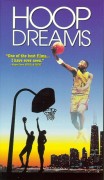 |
Featuring William Gates and Arthur Agee. |
|
||||||||||||||
No fictional sports movie has a story this good. Three hours culled from four years in the lives of two boys in inner-city Chicago, edited masterfully to provide a narrative and thematic drive, Hoop Dreams is the most frank representation of the life and aspirations of the urban poor in America. It is a critique of America, capitalism, the family (particularly fathers), and sports. It examines racism, poverty, drugs, and education. The film compels you to think about the gargantuan struggles some people face that we more privileged do not, which struggles are self-inflicted, and which are engendered by an uncaring, inefficient, and occasionally hostile system. It also makes us aware of the role of chance in our lives–a freak injury or an unpaid school bill can have unforeseen consequences down the road.
Hoop Dreams is not a downer, though. Resilience and faculty overcome heavy obstacles to provide a sense of hope. Dreams may be elusive, but love can keep us afloat. –Jeff
|
Academy Awards™ Other Major Awards |
Beauty and the Beast is by far the best of Disney's most recent animated features. It balances cute, cartoony humor with a well-written story so well that children and adults will find it equally satisfying. Belle is a heroine ahead of her time. The brown-eyed, brunette beauty is an avid reader with dreams of a bigger, more adventurous life than her provincial town can offer. Little does she know that her dreams are about to come true.
The Beast (he is never mentioned by name) is the quintessential romantic hero. Even in his monstrous form, he's magnetically attractive. A sensitive, tortured brute, he appeals to those of us who long to heal another soul with the power of our love. He meets Belle with his hair bristling and with an awesome, roaring voice (which I still can't believe came out of Robbie Benson), and slowly becomes an insecure, needy sweetheart.
We all know, intellectually, that we don't have the power to change any other individual but ourselves. But in our hearts, and in our fantasies, we yearn to make a difference, to forever alter our beloved's life. By just being herself, Belle literally transforms the Beast, and I don't know anybody who wouldn't find that romantic. –Jen
|
Academy Awards™ Other Major Awards |
 |
Starring Keanu Reeves, Laurence Fishburne, Carrie-Anne
Moss, Hugo Weaving, and Joe Pantoliano. |
|
||||||||||||||
The Matrix is a perfect encapsulation of fin-de-siécle zeitgeist at the doorstep of our new millennium. Blending comix/animé visuals, balletic kung-fu acrobatics, cyberpunk paranoia laced with pop culture references of days gone by, and mind-bending special effects that may soon render it passé, The Matrix captures our communal thoughtscape circa the late 20th century. Fittingly, that's what The Matrix is about–the collective dreamworld we inhabit and who has dominion over it.
Kicking off the theme that would be further explored in other, more "serious" films of 1999, such as Fight Club (#11) and American Beauty (#21), The Matrix exhorts us to take control of our lives. With its superhero parable of The One, it addresses the level to which we've allowed machines to remove us from that which is real. The Matrix reminds us that we are "the ones" with the power over our lives; all we have to do is exercise it.
Oh, yeah... It also kicks serious ass. –Alison
Read Carlo's full-length review and analysis.
|
Academy Awards™ Other Major Awards |
 |
Starring Frances McDormand, William H. Macy, Steve Buscemi,
Peter Stormare, and Harve Presnell. |
|
||||||||||||||
Fargo is not–as its opening title states–based on a true story, but that doesn't mean it's not about the truth. Tapping directly into the infinite wellspring of human folly, the Coen Brothers find both humor and pathos in this tale of one man's desperate attempt to cloak his mistakes and failures by arranging a "harmless" kidnapping of his wife. His blunders and miscalculations are compounded by those of the thugs he hires, creating a snowball effect that results in a slew of unintended carnage.
Though its tone is often lightened and enriched by the Coen's affection for mundane detail and local color, Fargo is as suspenseful and as thematically bleak as its stunningly atmospheric cinematography and score. The film's ray of hope is embodied in Marge Gunderson (McDormand), one of modern cinema's most awesomely crafted characters. Fargo is often chided for mocking the midwesterners who populate its story, but Marge puts the lie to that criticism. She's a true rarity: a character who demonstrates that simplicity is not stupidity, decency is not naiveté, and that sophistication is not a prerequisite for wisdom.
Equal parts dark humor and sincere lament, Fargo tells the truth about the blinding qualities of fear and greed, and about the absurdly predictable frailty and ineptitude of human beings. Yet somehow, it manages to conclude on a sublimely life-affirming note. Conjuring a universe that is at once singular and familiar, Fargo is that rarest of breeds: a film that genuinely merits the word unique. It is, quite simply, superb. –Dana
|
Academy Awards™ Other Major Awards
|
|
|

|